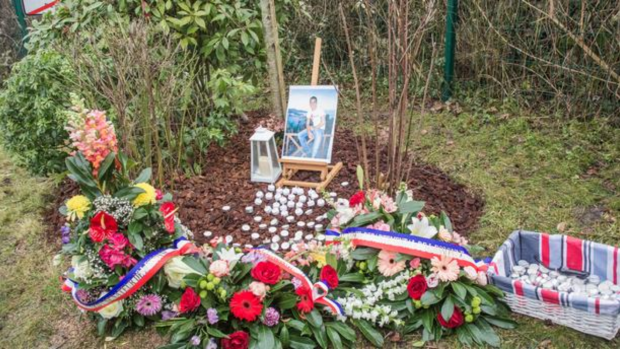 English
English Français
Français
Read in the news
|
Published on 23 February 2021
France - Dehumanizing murder of Ilan Halimi solemnly remembered amid continued threat of Antisemitism in France

Published on February 15th, in The Algemeiner
The emotional ceremony took place at the Jardin Ilan Halimi in the 12th arrondissement of the French capital — a public park where a simple memorial to Halimi that describes him as a “victim of antisemitism” is located. Sunday’s event began with those in attendance observing a minute’s silence in his memory.
The 23-year-old Halimi was kidnapped on Jan. 20, 2006, by a mainly Muslim gang calling themselves “The Barbarians.” Lured into the gang’s hands by a young woman who flirted with him in the cellphone store where he worked as a salesman, Halimi subsequently spent three weeks in captivity, during which he was constantly beaten and burned with cigarettes while tied to a radiator.
Throughout the ordeal, the gang attempted to extort 450,000 Euros in ransom money from Halimi’s relatives, believing them to be wealthy because — as one of the gang members later explained to French police — “Jews have money.”
On February 13, 2006, Halimi was dumped, barely alive and with burns on 80 percent of his body, near a railway track on the outskirts of Paris. Discovered by a passerby who called for an ambulance, Halimi died on his way to the hospital.
After a harrowing three-month trial in 2009, 27 members of the gang were sentenced to lengthy prison terms for their roles in Halimi’s murder. The Barbarians leader, Youssef Fofana, was sentenced to life imprisonment.
Some of those attending Sunday’s ceremony were young children at the time of Halimi’s death and grew up in the shadow of his story.
“As Jews, we grew up with this story, which is told in all our families,” a young man named Jordan — who was nine years old at the time of Halimi’s death — told broadcaster Europe 1.
“We think about it often. The wound still hasn’t healed,” Jordan said.
Another mourner, Joseph, said that Halimi’s experience had been a “trauma” for the whole community.
“The violence of his death, the torture, the absolute dehumanization — it was deeply, deeply shocking,” Joseph said.
Others in attendance at the somber ceremony on Sunday pointed to the persistent growth of antisemitism in France since Halimi’s death in 2006.
“There’s a feeling that it’s all been for nothing, that we’re not learning from the past,” a frustrated Francis Szpiner, a lawyer for Ilan Halimi’s family, told website Franceinfo on Sunday.
“Ilan Halimi was killed because he was Jewish, because there is prejudice against Jews. He was tortured and murdered because of it. Since then, there have been other deaths,” Jewish community activist Albert Herszkowicz told Le Parisien.
Victims of antisemitic violence in France in the years since Ilan Halimi’s death include those killed in terrorist attacks at a Jewish school in Toulouse in 2012 and a kosher market in Paris in 2015, as well as two elderly women murdered by antisemitic assailants in their own homes — Sarah Halimi (no relation to Ilan) in 2017 and Mireille Knoll in 2018.
Figures released at the end of January by the SPCJ, the French Jewish community’s security agency, showed that violent incidents targeting Jews remained consistent in 2020 despite the restrictions on movements and gatherings imposed by the COVID-19 pandemic. “The number — 44 — remained almost identical to the year 2019 — 45 — despite the three and a half months of confinement and the decrease in community activities,” the SPCJ said in statement accompanying the data.
#Hommage - Cela fait 15 ans qu'Ilan Halimi a été retrouvé agonisant le long des voies ferrées de Sainte-Geneviève-des-Bois.
15 ans que le monde a appris son nom.
Nous ne l'oublierons jamais. #IlanHalimi pic.twitter.com/FkZK43WMeW— CRIF (@Le_CRIF) February 12, 2021
The 15th anniversary of Halimi’s death was widely commemorated on social media as well. Among those paying tribute were French President Emmanuel Macron and Latifa Ibn Ziaten — a French Moroccan activist whose son Imad, a soldier in the French army, was murdered by the Islamist terrorist Mohammed Merah in Toulouse in 2012.
“Let us remember and pay homage to Ilan Halimi, who was kidnapped and tortured to death because of his Jewish faith,” Ibn Ziaten wrote on Twitter. “A thought for his family and loved ones. Never forget.”
Source :
The Algemeiner
